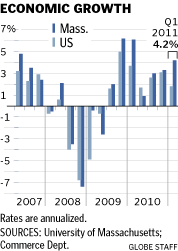Globe Staff / April 29, 2011
Massachusetts’ technology sector is fueling strong growth, helping the state’s economy expand more than twice as fast as the nation’s in the first three months of this year, the University of Massachusetts reported yesterday.
Global demand for technology products and increased business spending on software and equipment have provided a strong boost in Massachusetts, which has a high concentration of companies that sell high-tech equipment, components, and services, particularly to other businesses.
Alan Clayton-Matthews, an economics professor at Northeastern University and a senior contributing editor to MassBenchmarks, the UMass journal that released the analysis, said despite struggles with high unemployment and a stagnant housing market, the state’s “robust’’ technology sector has been an economic bright spot.
“It’s the reason we have a stronger economy than the country as a whole,’’ Clayton-Matthews said. “We export a lot of science and technology-based goods and services to other countries around the world, especially developing countries like China and India.’’
The global tech boom helped the Massachusetts economy grow at a 4.2 percent annual rate, accelerating from 3.3 percent in the last quarter of 2010, UMass said. The US economy expanded at a 1.8 percent rate in the first quarter, after growing at a 3.1 percent rate the previous period, the Commerce Department reported yesterday.
In March, the state’s 8 percent unemployment rate, though historically high, remained well below the national rate of 8.8 percent.
Reflecting technology’s strength, some Massachusetts companies are fiercely competing for skilled workers, offering cash bounties to find them.
Hubspot, a Cambridge marketing software start-up, recently offered $10,000 to anyone who could recommend the company’s next software development hire. Not to be outdone, Performable, another Cambridge marketing software start-up, offered $12,000 for a referral leading to the hiring of a software engineer.
“We basically have to offer cash to the public to help us find people,’’ Performable chief technology officer Elias Torres said. “Our recruiter cannot get us enough candidates.’’
Those extreme lengths might come as a surprise to those coping with job losses and sudden increases in gas and food prices. Hiring in many sectors has been slow, particularly in blue-collar industries such as construction and manufacturing. The housing market continues to struggle: sales are sluggish and prices are declining again.
Michael D. Goodman, the chairman of the public policy department at UMass Dartmouth and editor of MassBenchmarks, said the tech industry’s growth is good for the state, though the benefits are spread unevenly.
“The folks that benefit from technology growth are generally located in the Greater Boston area and work in firms where you have to have a level of training or technical skill,’’ Goodman said. “Underneath this robust growth remains a lot of inequity.’’
Technology’s relatively fast recovery from the recession was driven by strong business spending on equipment and software. Corporate spending on tech products and services accelerated in the first quarter, increasing at a 12 percent annual rate, after growing at an 8 percent rate at the end of 2010, the Commerce Department reported.
The Massachusetts economy has benefited from this trend. Two bellwethers of the state’s technology industry — Teradyne Inc. of North Reading and EMC Corp. of Hopkinton — both recently reported first-quarter revenues that grew nearly 20 percent from a year ago.
Teradyne, which makes semiconductor test equipment, said orders for its advanced machinery, which tests electronic components used in smartphones, tablets, and automobiles, increased by 30 percent while profits nearly doubled from a year earlier. Data storage and software giant EMC saw a 28 percent increase in first-quarter profits over last year.
Acme Packet Inc., a Bedford company that sells Internet voice and video delivery systems, recently reported that its revenues surged 45 percent from last year. Profits during the same period grew 65 percent.
Andre Mayer, senior vice president for research at Associated Industries of Massachusetts, the state’s largest employer group, said corporate profits, including successful high-tech companies, have been very high, yet many companies are sitting on their cash, preferring to spend it on new equipment rather than new employees.
“They’re not using it to hire a whole lot of people,’’ he said. “But they are investing in their production capacity and making themselves more efficient. They’re retooling for an economy that looks different than the one we’re used to.’’
Megan Woolhouse can be reached at mwoolhouse@globe.com. 

No comments:
Post a Comment